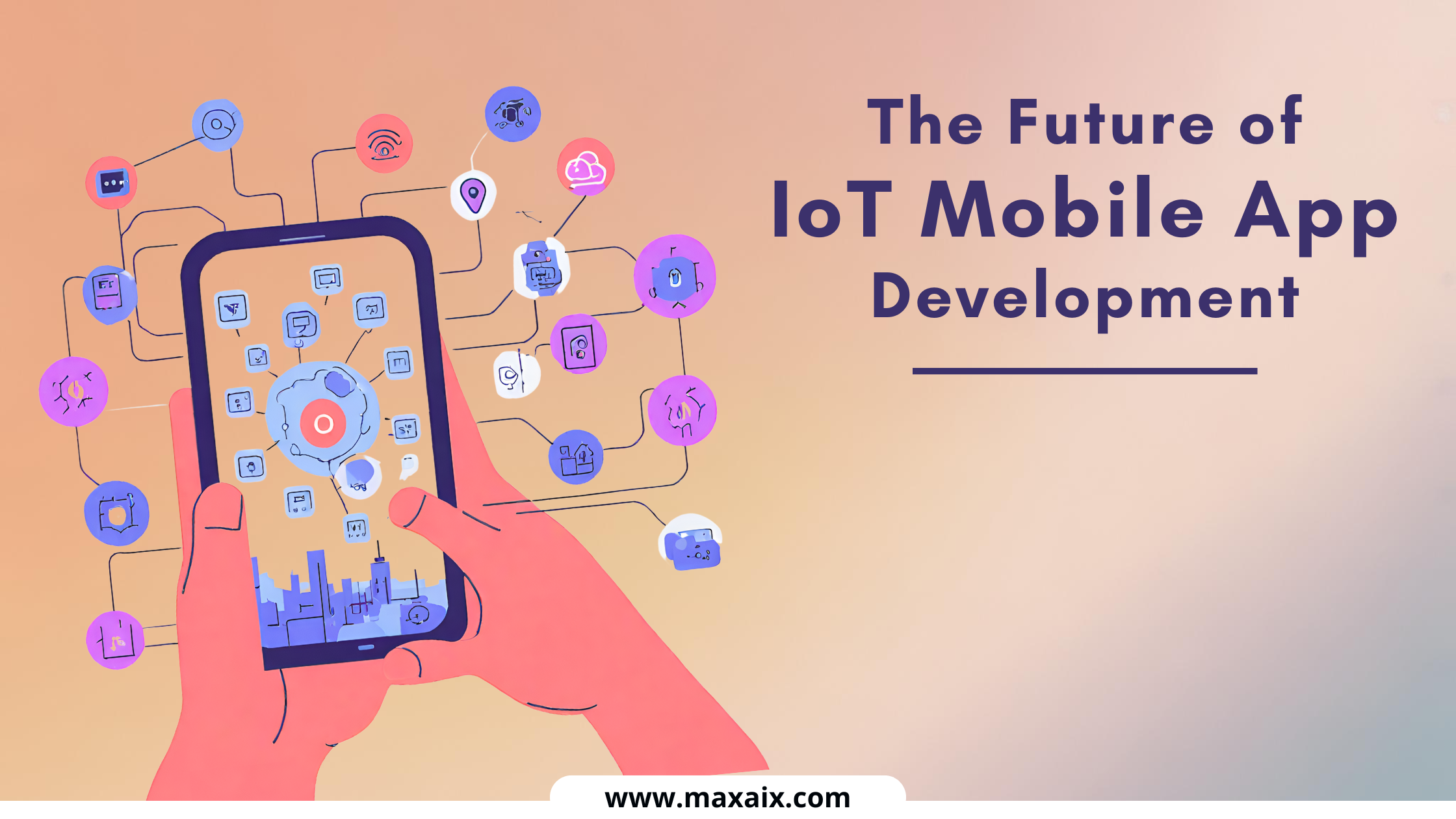IoT Mobile App Development Prospects in 2024

With unparalleled convenience, automation, and connection, the convergence of mobile apps and Internet of Things (IoT) technologies is revolutionizing the digital world. This comprehensive guide explores how IoT mobile app development will grow in 2024, looking at its reach, impact, trends, benefits, challenges, industry forecast, and Maxaix’s role in achieving IoT app development objectives. There is no copyright violation of any kind by AI, ChatGpt, Chatbot, or Google in this material.
What is IoT?
A network of networked devices with sensors, software, and connectivity capabilities is called the “Internet of Things” (IoT). They may now collect, distribute, and analyze data on their own. These devices might be anything from wearables and smartphones to industrial machinery and home appliances. They communicate with central systems to perform tasks, monitor conditions, and improve protocols. There are no instances of AI, ChatGpt, Chatbot, or Google copyright violation in this text at all.
IoT Scope in Mobile Apps
Mobile apps may now seamlessly integrate with a wide range of smart devices and sensors thanks to Internet of Things technology, which also improves their functionality. Mobile applications serve as user interfaces, data collectors, and control centers for IoT-powered devices. This gives users the ability to monitor, control, and interact with their linked environment from a distance at any time or place.
Introduction to IoT Mobile App Development
Creating software applications that connect, control, and communicate with intelligent objects using IoT technology is the process of developing mobile apps for the Internet of Things. To ensure seamless communication between mobile applications and IoT devices, developers utilize programming languages, frameworks, and platforms to create user-friendly interfaces, run data processing algorithms, and connect with IoT protocols and APIs.
Why are IoT Mobile Apps the Future of Smart Devices?
For many reasons, IoT mobile applications are perfect for centralized support for smart device ecosystems.
- Uninterrupted Connectivity: IoT mobile apps make it easier for users to monitor and control their environment by allowing them to communicate and stay connected with a wide range of smart devices.
- Personalized Experiences: By providing experiences that are catered to user preferences, behavioral patterns, and contextual data, Internet of Things mobile applications improve user pleasure and engagement.
- Automation and Intelligence: To improve the ease and effectiveness of repetitive operations, Internet of Things mobile applications make use of data analytics, machine learning, and artificial intelligence. Moreover, work automation, process efficiency, and cognitive insights are made possible by these technologies. There is no copyright violation of this content by Google, ChatGpt, AI, or Chatbot.
What is the Impact of IoT on Mobile App Development?
IoT technology has a significant impact on mobile app development.
- Expanded Features: Internet of Things (IoT) gives mobile applications expanded features including remote monitoring, real-time notifications, proactive maintenance, and smart automation.
- Increased User Interactions: Internet of Things (IoT) increases user interactions by providing customized, context-sensitive interactions, easy-to-use controls, and constant connectivity with other smart devices and services.
- Emerging revenue potential: Through subscription plans, in-app purchases, special features, and extra services created for IoT-enabled experiences, IoT offers new revenue potential for mobile app developers.
How IoT is Changing Mobile Apps: Development Trends
Several crucial themes in the development of mobile apps are being driven by IoT:
- Edge Computing: Edge computing reduces latency and improves responsiveness for Internet of Things mobile apps by enabling immediate data processing and analysis at the network’s edge.
- AI and Machine Learning: These two fields of study provide the models that drive the predictive analytics, intelligent automation, and anomaly identification capabilities found in IoT mobile apps. These models let users make informed decisions and take preventative action.
- Blockchain Integration: Decentralized and dependable exchanges across networks of connected devices and platforms are made possible by blockchain technology, which also improves security, privacy, and transparency in IoT data transfers.
- Voice and Gesture Control: These technologies allow users to interact with Internet of Things smartphone apps hands-free, providing a more natural and intuitive way to operate smart devices.
Benefits of IoT Mobile App Development
There are several benefits that IoT mobile app development offers to customers and organizations.
- Increased Productivity and Efficiency: IoT mobile apps increase productivity by streamlining procedures, automating chores, and making the most use of available resources.
- Augmented Convenience: IoT mobile apps provide remote access and control, simplify daily routines, and give personalized experiences according to user preferences.
- Advanced Decision-Making: IoT mobile apps use analytics and real-time data to offer insights, trends, and recommendations that support preemptive and well-informed actions.
- Adaptability and Scalability: Internet of Things mobile applications can accommodate an expanding number of connected devices, users, and use cases due to their scalability and flexibility.
Hurdles in IoT Mobile Applications and Solutions
IoT mobile app development has drawbacks despite its benefits:
- Security Risks: Unauthorized access, virus attacks, and data breaches are just a few of the security risks that can affect Internet of Things devices and networks. Strong authentication, access control, and encryption must be put in place to address these security threats.
- Compatibility Problems: Because IoT devices frequently use proprietary protocols and standards, there might be compatibility issues. The smooth integration and interoperability of several platforms and devices is the responsibility of developers.
- Data privacy: Since IoT creates a lot of sensitive data, concerns over data collecting, storage, and sharing are warranted. Respecting laws like the CCPA and GDPR is essential to preserving user privacy and confidence.
- Complexity and Scalability: The creation of Internet of Things mobile applications is a resource-intensive and complex process that calls for knowledge of hardware integration, network protocols, and data analytics. As the quantity of data and the number of connected devices increases, scalability problems emerge.
Factors that Make IoT Mobile App Development Demanding
Several problems impede the development of mobile apps for the Internet of Things:
- Hardware Integration: To integrate IoT devices with mobile apps, a thorough grasp of communication protocols, sensor technologies, and hardware interfaces is essential.
- Real-time Data Processing: Efficient processing, storage, and analysis capabilities are required to handle the massive amounts of real-time data streams that Internet of Things mobile apps need to manage.
- Cross-platform Compatibility: Ensuring compatibility across a range of mobile platforms, operating systems, and device settings adds a layer of complexity to the work of designing Internet of Things mobile apps.
- Security and Compliance: To handle security risks and compliance requirements, it is crucial to implement strong authentication, encryption, and data protection mechanisms.
Industries that Can Take Advantage of IoT Mobile Apps in the Upcoming Years
Many different businesses may use IoT mobile applications to increase efficiency and open new opportunities.
- Healthcare: By enabling telemedicine, tailored healthcare delivery, and remote patient monitoring, IoT mobile apps improve access, efficiency, and patient outcomes.
- Smart Home: Smart home automation, energy savings, and convenience are offered via IoT mobile applications that control equipment such as security cameras, lights, and thermostats.
- Manufacturing: To improve output and quality control, IoT mobile apps improve production processes, manage inventories, and track equipment performance in manufacturing plants.
- Transportation: By tracking car fleets, streamlining route planning, and giving passengers real-time information, IoT mobile apps improve customer happiness, safety, and efficiency.
- Retail: Location-based promotions, customized shopping experiences, and inventory management capabilities are all provided by IoT smartphone apps, all of which increase client loyalty.
How Can Maxaix Help Implement IoT App Development? Start Building Your IoT Mobile App Today!
Maxaix provides comprehensive solutions and knowledge to hasten the creation of Internet of Things applications:
- IoT Platform: Maxaix’s IoT platform accelerates the creation, implementation, and administration of IoT applications, with support from device connection, data processing, and analytics.
- Developer Tools: Maxaix provides developer tools and resources, such as SDKs, APIs, and documentation, to expedite the development process and hasten the market release of IoT mobile apps.
- Consultancy Services: Maxaix’s consultancy services assist companies in planning, developing, and implementing IoT solutions tailored to their unique requirements and objectives, ensuring project success and return on investment.
- Integration Services: Maxaix’s integration services enable effortless integration of IoT mobile apps with existing platforms, systems, and external services, facilitating data interchange and interoperability.
Conclusion
IoT mobile app development will drive unmatched innovation, connectedness, and value creation for organizations and consumers in 2024. By leveraging Maxaix’s experience and solutions, organizations can embark on their IoT journey, explore new possibilities in the digital world, and understand the breadth, impact, trends, advantages, obstacles, and industry potential of IoT mobile apps.
Frequently Asked Questions(FAQs)
What is IoT mobile application development, and why is it important?
We refer to the process where we create software applications that leverage IoT technologies to connect, control, and communicate with smart devices as IoT mobile application development. This technique is essential as it drives intelligent operations, automation, and seamless integration with networked systems.
What are the benefits of IoT mobile app development?
Creating mobile apps for the Internet of Things offers many advantages such as increased productivity, more comfort, better decision-making, scalability, and flexibility. These advantages empower companies to explore new opportunities and deliver enhanced experiences to their clients.
What challenges do developers face in IoT mobile application development?
When developing mobile IoT apps, developers encounter several difficulties. Complexity, scalability, compatibility, security hazards, and data privacy concerns are a few of these difficulties. To overcome these obstacles, one must possess expertise in cross-platform interoperability, real-time data processing, and hardware integration.
Which industries can take advantage of IoT mobile apps in the upcoming years?
IoT mobile apps may help a variety of industries, including manufacturing, transportation, smart homes, healthcare, and retail. various apps can facilitate the smoother, more inventive, and efficient operation of various industries.
How can Maxaix help implement IoT app development?
A variety of services are provided by Maxaix to help with IoT application development deployment. These consist of an Internet of Things platform, tools for developers, integration services, and advisory services. Businesses can accomplish their IoT goals and give their consumers better experiences with the help of these services.


